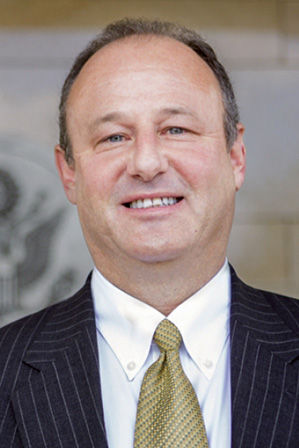Welcome, Director General Bernicat! AFSA Stands Ready to Work with You
President’s Views
BY ERIC RUBIN

We here at AFSA are happy to welcome the new Director General of the Foreign Service, Ambassador Marcia Bernicat. We know her well from her previous outstanding work, and we look forward to working with her and her team to improve the Foreign Service. We’re here to help make the Service stronger, more attractive to applicants and more supportive and caring to active-duty and retired members.
What will strengthen the Foreign Service? First and foremost, we need to focus on making a commitment to public service appealing and feasible for FS members. We want to join the DG in the following pursuits:
1. Making a Foreign Service career work for employees in 2022. This includes addressing the needs of two-career couples, single FS members and families with children. It means supporting employees who face constant challenges and frustrations, whether traveling with pets or keeping families together or getting help with moves as a single. It also includes ensuring that members of the Foreign Service with disabilities are able to pursue their careers with support and reasonable accommodation.
2. Prioritizing support for employees. This comes up in situations where employees must make difficult and long journeys to and from post, even though the U.S. government travel regulations provide for exceptions to the Fly America Act and city-pair fares. For example, forcing employees to take two or three flights when one direct flight is available and allowable is a morale killer. This kind of bureaucratic frustration, and others like it, drives attrition.
3. Fixing what is broken. AFSA has made progress working with all six foreign affairs agencies to fix what is not working for our members. From intake to assignments, evaluations to promotions, our system continues to be based on the Foreign Service Act of 1980, a law that needs updating and modernizing. The act was adopted only a few years after the end of policies that forced women to resign when they married, and required wives—not spouses, but wives—to be evaluated on their husbands’ annual efficiency reports. There is a lot in the Foreign Service Act that should be preserved, but much also needs updating.
4. Increasing transparency. AFSA has welcomed innovations that have led to the advertising of vacancies for deputy assistant secretary positions as well as other senior State Department positions. This is a best practice that all foreign affairs agencies should follow. It is not just about transparency, but also about ensuring that the best candidates have a real chance of rising to senior positions.
5. Taking care of our people. The Biden administration has done much to support employees who have been affected by Anomalous Health Incidents (Havana syndrome), but recent developments appear to point to an effort to limit relief and exclude many employees who have truly suffered injury in service to their country. We need to see an effort that helps every injured employee, rather than attempts to limit eligibility for support and compensation.
6. Growing the Foreign Service. Today, there are not enough FS members serving overseas. The Biden administration has taken small steps to remedy this situation, but we still have too many overseas posts that are desperately understaffed. We are spending less in real dollar terms on diplomacy and foreign assistance than we did 30 years ago at the end of the Cold War. This severely limits our ability to compete in a new world in which we have to earn and demonstrate our leadership.
We wish Director General Bernicat well as she takes on this challenging new position. AFSA is committed to working constructively with her and her team to help make the Foreign Service a more attractive career better equipped to meet our country’s challenges.

